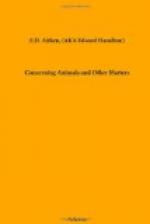Eha certainly found company in beasts all his life, and kept the charm of youth about him in consequence to the end. If his lot were cast, as it often was, in lonely places, he kept pets, and made friends besides of many of the members of the tribes on his frontier; if in Bombay city he consoled himself with his aquarium and the museum of the Bombay Natural History Society. When the present writer chummed with him in a flat on the Apollo Bunder in Bombay, he remembers well that aquarium and the Sunday-morning expeditions to the malarious ravines at the back of Malabar Hill to search for mosquito larvae to feed its inmates. For at that time Mr. Aitken was investigating the capabilities for the destruction of larvae, of a small surface-feeding fish with an ivory-white spot on the top of its head, which he had found at Vehar in the stream below the bund. It took him some time to identify these particular fishes (Haplochilus lineatus), and in the meantime he dubbed them “Scooties” from the lightning rapidity of their movements, and in his own admirable manner made himself a sharer of their joys and sorrows, their cares and interests. With these he stocked the ornamental fountains of Bombay to keep them from becoming breeding-grounds for mosquitoes, and they are now largely used throughout India for this very purpose. It will be recognised, therefore, that Mr. Aitken studied natural history not only for its own sake, but as a means of benefiting the people of India, whom he had learned to love, as is so plainly shown in Behind the Bungalow.
He was an indefatigable worker in the museum of the Bombay Natural History Society, which he helped to found, and many of his papers and notes are preserved for us in the pages of its excellent Journal, of which he was an original joint-editor. He was for long secretary of the Insect Section, and then president. Before his retirement he was elected one of the Vice-Presidents of the Society.
Mr. Aitken was a deeply religious man, and was for some twenty years an elder in the congregation of the United Free Church of Scotland in Bombay. He was for some years Superintendent of the Sunday School in connection with this congregation, and a member of the Committee of the Bombay Scottish Orphanage and the Scottish High Schools. His former minister says of him, “He was deeply interested in theology, and remained wonderfully orthodox in spite of” (or, as the present writer would prefer to say, because of) “his scientific knowledge. He always thought that the evidence for the doctrine of evolution had been pressed for more than it was worth, and he had many criticisms to make upon the Higher Critics of the Bible. Many a discussion we had, in which, against me, he took the conservative side.”




